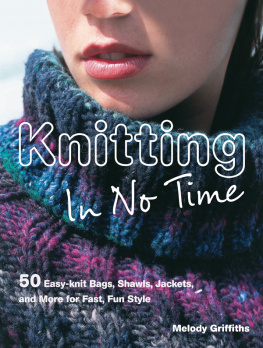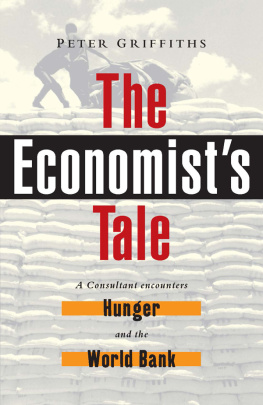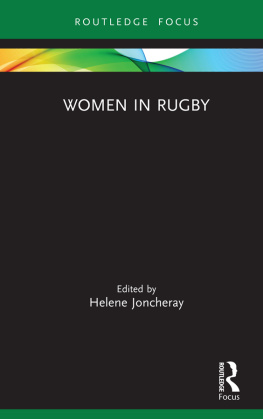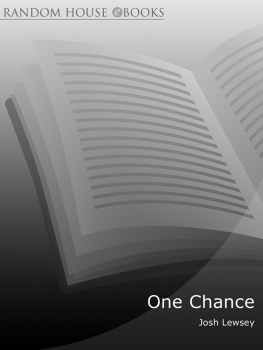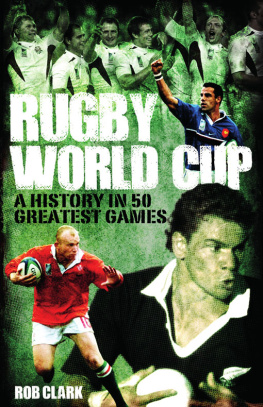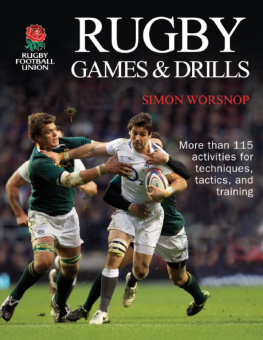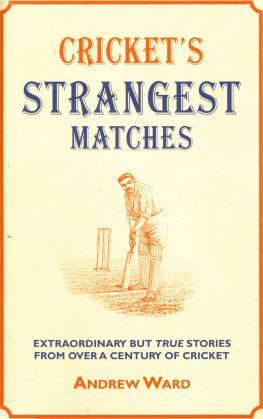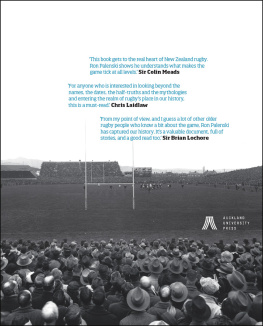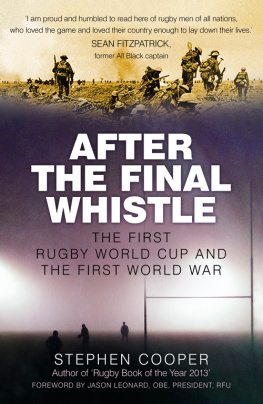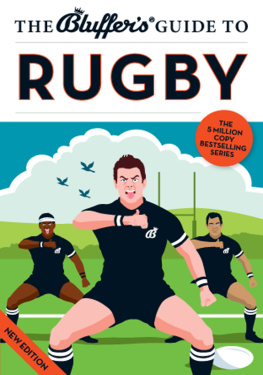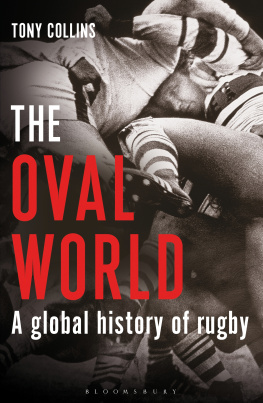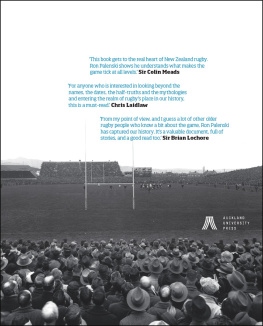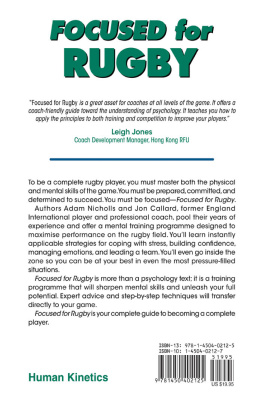
Other titles in the STRANGEST series
Footballs Strangest Matches
Laws Strangest Cases
Londons Strangest Tales
Titles coming soon
Crickets Strangest Matches
Golfs Strangest Rounds
Kents Strangest Tales
Medicines Strangest Cases
Motor-racings Strangest Races
Runnings Strangest Tales
Shakespeares Strangest Tales
Teachers Strangest Tales
Tenniss Strangest Matches

Extraordinary but true stories
from over a century of rugby
PETER SEDDON

CONTENTS
INTRODUCTION
Rugbys Strangest Matches describes some of the games most curious occasions of the past 145 years. Any unusual team or individual performance, or any occurrence during or surrounding a match that was a clear departure from the normal run of things, has been regarded as strange and thus worthy of inclusion.
This collection of true stories includes the match when an Irish international player arranged his marriage in order to qualify for leave of absence to play against England, the occasion when a team of top English soccer players beat their rugby counterparts at the 15-a-side game, the game where an almost complete unknown played for his country due to an administrative mistake, and the match where a well-known referee was sent off.
Naturally, strangeness is subjective depending on the circumstances at the time and ones own point of view. Therefore there may well be some argument relating to what has been included and what has been left out. For the most part, the stories concentrate on the games played at senior international level because these attracted more attention and wider media coverage. No doubt there are many others, which would qualify for inclusion, but for which there are no reported accounts.
The majority of the work is based on newspaper research and personal memories. My first debt of gratitude is therefore to the recorders of the game, past and present, for setting down what otherwise would have been lost for all time. In particular, the personal recollections and lighter asides, in word and in print, of Viv Jenkins, Frank Keating, Ian Malin, David Hands, John Mason, Steve Jones, Rob Wildman, Brendan Gallagher, Patrick Lennon and Mick Cleary have helped to illuminate many of the stories appearing in this collection.
Elsewhere, behind the scenes, I owe a debt of gratitude to three old friends, Tim Auty of Leeds, Geoff Miller in New Zealand and Tony Lewis of Pyle in South Wales for suggesting ideas and forwarding copies of cuttings from their own archives. Finally, thanks go to Jeremy Robson for commissioning the original edition, and to Lorna Russell at Robson Books and more recently Nicola Newman and Katie Hewett at Pavilion for their skilful and patient management of the project.
John Griffiths
DR ALMONDS WORDS OF WISDOM
EDINBURGH, MARCH 1871
Rugby unions first international was always going to be a strange match. The background to the occasion gives some insight into the unusual circumstances surrounding international sport nearly 130 years ago.
There had been a soccer international between England and a Scotland XI in November 1870. Englands win by a goal to nil angered those north of the Border, where it was contended that the only connection the losers had with their country was a liking for Scotch whisky. The Scots asserted that the principal version of football played at their schools and universities was rugby and they issued a challenge to England to pick a side for an international rugby match to be staged at Raeburn Place, Edinburgh, in March 1871.
The English accepted and their selected 20 (13 forwards and seven backs) got down to earnest preparations for the big match. Typical of the training undertaken by their players was the regimen of one John Henry Clayton, a forward from the Liverpool club. Weighing in at more than 17st (108kg), his training makes fascinating reading. For a month before the match he ran 4 miles (6.4km) every morning, his large Newfoundland dog making the pace. A 4-mile (6.4-km) horseback ride took him to his Liverpool office where he put in a 12-hour day, 8a.m. to 8p.m., before making the return journey home to a dinner of underdone-beef-and-beer. He laid claim to a frugal and strenuous life otherwise.
Travelling arrangements were in stark contrast to those of today. England travelled north on Saturday night (for the Monday match) in third-class rail carriages with bare board seats. Arriving at dawn next day, they took baths before finding accommodation. All travelling and hotel expenses were met by the players themselves.
The next day dawned bright and clear and more than 2,000 spectators arrived to see Scotland win on a pitch that was judged narrow compared with English standards. The game was largely a protracted maul imagine rugby today being played among 40 men, most of them forwards and several of the laws peculiar to the Scottish version of rugby were adopted. England, in short, were clearly playing against the odds. Even so, in the two halves of 50 minutes each, their backs impressed Scottish observers with their willingness to run with the ball.
Scoring by points was not introduced to rugby football until the late 1880s and at the time of this inaugural international the only way a match could be won was by a majority of goals: drop goals or converted tries. (Penalty goals would not sully rugbys scoring until more than 20 years later.) Tries alone were of no value. They simply enabled sides to try for a goal.
Scotland scored the only goal of the match early in the second half. They succeeded in pushing a scrummage over the England goal line and to Angus Buchanan, who grounded the ball, fell the distinction of scoring the first try in international rugby. But not before England had disputed its legality.
A lengthy and by all accounts heated debate ensued before the try was allowed to stand. Referees did not appear in matches until the mid-1870s so appeals were heard by umpires (later known as touch judges). The umpire who awarded the try, which was converted into a goal by William Cross with a fine kick, was Scotlands Dr Almond, the well-known headmaster of Loretto.
The wisdom behind his allowing the score was later set in print: Let me make a confession, he wrote. I do not know whether the decision which gave Scotland the try from which the winning goal was kicked was correct in fact. When an umpire is in doubt, I think he is justified in deciding against the side which makes most noise. They are probably in the wrong. Both sides added later tries but in the absence of successful conversions, Scotland held their controversial lead. Accounts of the match refer to their superior fitness so it seems reasonable to assume that the better side won.
IRISH CHAOS
THE OVAL, FEBRUARY 1875
Irelands entry into international rugby in 1875 was surrounded by chaos. The Irish Football Union was formed in November the previous year but, much to the annoyance of the Belfast rugby clubs, none of their representatives were present. That same month in Belfast, a representative Dublin club rugby XV played their Belfast counterparts in a forerunner of what is now the LeinsterUlster inter-provincial matches. There was great interest in the match, as it was perceived as a trial for the forthcoming international against England.
Next page





